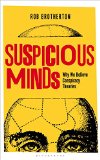
Why We Believe Conspiracy Theories
by Rob Brotherton
Decoding the psychology of believing in conspiracy theories. We're all conspiracy theorists - some of us just hide it better than others.
Conspiracy theorists aren't just a handful of people who wear tin-foil hats and have bizarre ideas about shape-shifting reptilian aliens. Conspiracy theories are as likely to appeal to women as to men, college students as to retired professors, middle-class bloggers as to blue-collar workers.
Psychological research sheds light on why some people are more drawn to conspiracy thinking, especially when they feel discontented, distrustful, and desire privileged knowledge. But ultimately we are all natural-born conspiracy theorists. Our brains are wired to see patterns and to weave unrelated data points into complex stories. We instinctively see events in the world in terms of human motives and intentions, leading us to discount the role of chance and unintended consequences, and we look for some hidden hand behind catastrophic events. These psychological quirks can lead us to suspect a conspiracy where none exists.
Conspiracy theories have existed throughout history, from ancient Athens and Rome to present day theories about 9/11 and who shot JFK. Suspicious Minds explores the phenomenon and reveals the important consequences conspiracy theories can have--from discouraging parents from vaccinating their children against deadly diseases to hampering political policies to combat climate change.
"Starred Review. While Brotherton might not convince all believers to remove their tinfoil hats (a concept whose origin he explains), it's sure to make readers question their worldview." - Publishers Weekly
"Starred Review. Clearly written and with liberal use of humor and numerous examples from scholarly research, this title provides a valuable look at why conspiracy theories abound and why we should continually assess our thinking." - Library Journal
"A thoughtful, general analysis of conspiracy theories arguing that belief in secret plots is neither new nor unusual but a time-tested part of the human experience." - Kirkus
This information about Suspicious Minds was first featured
in "The BookBrowse Review" - BookBrowse's membership magazine, and in our weekly "Publishing This Week" newsletter. Publication information is for the USA, and (unless stated otherwise) represents the first print edition. The reviews are necessarily limited to those that were available to us ahead of publication. If you are the publisher or author and feel that they do not properly reflect the range of media opinion now available, send us a message with the mainstream reviews that you would like to see added.
Any "Author Information" displayed below reflects the author's biography at the time this particular book was published.
Rob Brotherton, a former lecturer in psychology at Goldsmiths, University of London, is a leading expert on the psychology of conspiracy theory. He has written about conspiracy theories for periodicals such as New Scientist and the Skeptic magazine, and on his website, conspiracypsychology.com. He currently lives in New York City.
Your guide toexceptional books
BookBrowse seeks out and recommends the best in contemporary fiction and nonfiction—books that not only engage and entertain but also deepen our understanding of ourselves and the world around us.